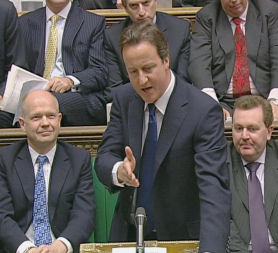Fixed-term parliaments and the 55% rule
Updated on 14 May 2010
What do the new rules on fixed-term parliaments mean - and why is the idea that 55 per cent of MPs would have to end a parliament causing concern?

Why are we getting fixed-term parliaments?
To provide a bit of certainty in these uncertain political times. The Lib Dems have long campaigned for fixed-term parliaments, which are the norm in countries including the USA, Canada, Australia, New Zealand and Scotland.
The new Conservative and Lib Dem coalition has agreed to bring in five-year parliaments, meaning the next general election is already pencilled in for 7 May 2015.
This makes it much harder for the PM to call a snap vote at a time to suit them.
Who decides how long parliament lasts at the moment?
Currently, the Queen has the power to end, or dissolve, a parliament - triggering a general election. The prime minister can choose when to go to the Palace to request a dissolution.
The Queen could refuse if she thought that someone else - the opposition leader, for example, would be able to takeover as PM and get the support of a majority of MPs. That's pretty unlikely though - the chances are, her majesty would agree to the request.
Who chooses when to end the fixed-term parliament?
It should do what it says on the statue book, and run for a fixed term. But there is a get-out-early clause.
The new government plans to give MPs the power to dissolve parliament. The law that brings in fixed-term parliaments "will also provide for dissolution if 55 per cent or more of the House votes in favour", according to the coalition agreement.
Why 55 per cent?
This 55 per cent threshold is higher than in normal parliamentary business - legislation usually passes on a simple majority of over half of the 650 MPs.
The Tories and Lib Dems together hold just over 55 per cent of the seats - so it would take more than just one of the coalition partners to decide to pull the plug.
And the Tories have just over 47 per cent of the MPs in the Commons - so even Labour, the Lib Dems and the other minority MPs combined wouldn't be able to cobble together 55 per cent without the support of Tory rebels.
What about confidence votes?
It's a basic principle that the government should be able to command the confidence of parliament. This means getting the support of a simple majority of MPs on crunch issues.
To test this, the opposition can table a motion of confidence in the government. Traditionally the Queen's speech is also an issue of confidence, as is any vote the government has said will be an issue of confidence.
If the PM loses a vote of confidence, according to government guidelines they're "required to resign or where it is appropriate to do so instead, may seek a dissolution of parliament".
It’s rare for a government to lose a confidence vote - it's only happened once since 1924. James Callaghan's government was brought down by just one vote in 1979, triggering the election that swept Margaret Thatcher to power. But then, these are rare political times.
Do the new rules affect confidence votes?
"The mechanism for a no confidence vote in the government is unchanged but what our proposals would do is give parliament a new power to dissolve itself, a power currently only exercised by the prime minister," Sir George Young, leader of the Commons, wrote on ConservativeHome today.
But this has done little to calm the concerns of some Conservative and senior Labour figures.
If the PM loses a confidence vote by just over 50 per cent of MPs, they still would be expected to resign. But there is now a question mark over the dissolution process.
If the PM needs to get the higher threshold of 55 per cent of MPs to vote for a dissolution, in theory the government could lose a confidence vote, but then not be able to muster enough MPs to vote for the end of the parliament.
If this is not the case, and a PM who lost a confidence vote would still be expected to request a dissolution of parliament without putting it to a vote, the government would be able - in theory - to circumvent the 55 per cent rule by making something it expected to lose into an issue of confidence.
What happens next?
The Cabinet Office pointed out that this is still only set out in the first version of the coalition agreement - a more detailed version is set to follow. This should spell things out in more detail.
The government plans to put a "binding motion" before the Commons within days, then legislate on fixed-term parliaments and the new dissolution powers. This law could still be repealed, though - and by the usual simple majority rather than the 55 per cent of MPs.
What happens in Scotland?
The Scottish parliament, where coalitions are common, has an even higher threshold for dissolution: two-thirds of MPs must vote to end the parliament. The parliament can't just carry on endlessly without a government, though - it is also dissolved if the first minister resigns, and a new replacement isn't agreed on within 28 days.





